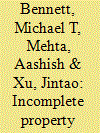|
|
|
Sort Order |
|
|
|
Items / Page
|
|
|
|
|
|
|
| Srl | Item |
| 1 |
ID:
128525


|
|
|
|
|
| Publication |
2013.
|
| Summary/Abstract |
Much of the urban growth in developing countries is taking place along infrastructure corridors that connect cities. The villages along these corridors are frenzied and contested sites for the consolidation and conversion of agricultural lands for urban uses. The scale of changes along these corridors is larger than the political jurisdiction of local governments, and new regional institutions are emerging to manage land consolidations at this corridor scale. This article compares two inter-urban highways in India and the issue image_86_4_Hwy Urbanization - Balakrishnanhybrid regional institutions that manage them: the Bangalore- Mysore corridor, regulated by parastatals, and the Pune-Nashik corridor, by cooperatives. It traces the emergence of parastatals and cooperatives to the turn of the twentieth century, the ways in which these old institutions are being reworked to respond to the contemporary challenges of highway urbanization, and the winners and losers under these new institutional arrangements. I use the term "negotiated decentralization" to more accurately capture the back-and-forth negotiations between local, regional and state-level actors that leads to context-specific regional institutions like the parastatals and cooperatives
|
|
|
|
|
|
|
|
|
|
|
|
|
|
|
|
| 2 |
ID:
110498


|
|
|
|
|
| Publication |
2011.
|
| Summary/Abstract |
Trust and property rights are generally considered to influence farmers' behavior regarding resource use and environmental management. Previous studies show that higher trust levels may enhance contributions to public goods. This paper investigates how trust and (land) property rights security influence the provision of one concrete public good: land protection through the Sloping Land Conservation Program in China. The analysis is based on household survey data from Ningxia Autonomous Region in China. From our questionnaire two trust factors are derived and distinguished, using factor analysis: general trust and kinship trust. Farm households are less likely to contribute to public goods when they perceive more secure land rights, but trust has mixed effects on public goods. The results show that general trust and kinship trust may rely on two opposite effects for influencing public goods provision. On the one hand, high levels of general trust may directly enhance people's willingness to provide contributions to public goods (by reduced likelihood to reconvert forest land) when farmers are aware of the positive environmental effects of the program, that's the public goods effect. On the other hand, general trust may also make it more likely that people invest more in their own private goods to pursue their own welfare (a more likely reconversion of forest land to arable land), that's the private goods effect. The final outcome depends on the size and direction of both effects. Compared to general trust, kinship trust is more inward-looking and self- or group-interested compared to more reciprocal general trust. Thus, unlike general trust, kinship trust may have no significant public goods effect on the provisioning of public goods.
|
|
|
|
|
|
|
|
|
|
|
|
|
|
|
|
| 3 |
ID:
110497


|
|
|
|
|
| Publication |
2011.
|
| Summary/Abstract |
This paper uses data from a 2003 rural survey to examine the determinants of household provision of environmental services under China's Sloping Land Conversion Program (SLCP), the largest payments for environmental services program in the developing world. The paper examines the determinants of plot-level survival rates of program-planted trees and grasses. It finds that household rights over retired land as well as autonomy in program decision-making (which we argue on the basis of supportive evidence are plausibly exogenous to post-retirement outcomes) have important and potentially countervailing impacts on the provision of environmental services targeted by the program. Households permitted to select what to plant obtain better program outcomes, but do not make the choices that the government would like them to, while those permitted to decide what land to retire perform worse. The analysis also finds that households more vested and experienced in agriculture and with less exposure to off-farm labor markets fare better in managing their planted trees. Significant learning-by-doing effects are also evident, suggesting that greater technical support to farmers could improve outcomes and lower program costs.
|
|
|
|
|
|
|
|
|
|
|
|
|
|
|
|
| 4 |
ID:
128526


|
|
|
|
|
| Publication |
2013.
|
| Summary/Abstract |
Since 2000 in New Delhi, urban decentralization has mainly come in the form of the highly visible Bhagidari or partnership scheme, inviting city residents to participate in a "process of dialogue and the discovery of joint-solutions." This paper critically examines this program between 2000 and 2012, through the experiences of primarily middle-class neighbourhood organizations (called Resident Welfare Associations, or RWAs) that were included in the scheme. The paper argues that rather than constitutional decentralization, Bhagidari as an initiative must be read in terms of a larger shift to entrepreneurial governance. Bhagidari's success has been in delegating management to voluntary middle-class neighbourhood associations called RWAs, at little cost to city government, while seemingly opening up a "participatory" space for middle-class urban issue image_86_4_Decentralized Delhi_Mehraresidents in civic affairs. However, the article argues that Bhagidari's impact has come to represent an attempt at harnessing and managing the new middle-class aspiration to engage with urban government for administrative and political ends. In this context, Bhagidari has also been seen as an important means of cultivating middle-class consent and a constituency through courting RWAs for an ambitious chief executive. Over time, this has become a common strategy for building political and civic visibility for a range of actors, and thus the number of RWAs has proliferated
|
|
|
|
|
|
|
|
|
|
|
|
|
|
|
|
|
|
|
|
|